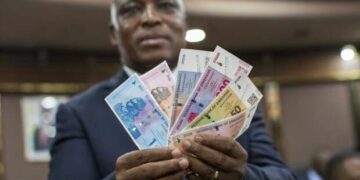Nigeria’s economy is projected to grow by some 2.9 percentage points in 2021.
The 2.9 per cent Gross Domestic Product (GDP) growth projection by the Nigerian Economic Summit Group (NESG) is almost double the 1.5 per cent GDP growth projection by the International Monetary Fund (IMF) in its January 2021 World Economic Outlook (WEO) Update report.
The IMF in its WEO Update report further projected a 2.5 per cent economy growth for the continent’s biggest economy in 2022, but the IMF’s 2022 projection falls considerably below the 5.5 per cent growth rate projection by NESG.
NESG, in its recently published report stated that, the Nigerian economy in a ‘best case scenerio,’ will experience expansion in real GDP terms by 2.9 per cent in 2021, 5.5 per cent in 2022 and 7.5 per cent by 2025.

Growth of the economy, the group notes, will be driven largely by expansion in major sectors such as agriculture, telecommunications, financial Institutions, construction, trade and manufacturing.
This it further reveals in the report will result in an increase of the federal government’s total revenue by 23.3 per cent in 2021 and expand by an average of 30 percent over the next five years.
“Inflation rate will moderate to 14.5 percent in 2021 and move down to 11.2 percent in 2025. In addition, the unemployment rate will fall to 26 percent and 19.3 percent in 2021 and 2025 respectively. In the best case scenario, the Nigerian economy recovers swiftly from the recession and gets on a path of high and sustainable growth that delivers improved social welfare,” read part of the NESG report.
Further in the report, NESG points out that some key policies and events such as the decision of OPEC+ to increase oil production output, early implementation of the government’s 2021 Appropriation Bill and a partial lockdown in some states will shape the Nigerian economy.
“In 2020, OPEC and its allies started to implement a production cut of 7.7 million barrels of crude oil per day. With the prospect of improved global oil demand in sight, the oil cartel has agreed to increase its crude oil output by 500,000 barrels per day starting from January 2021. Nigeria would benefit from the increase in output via oil GDP and oil revenue increase.”
“On December 31, 2020, President Buhari signed the 2021 Appropriation Bill into law with an expenditure outlay of N13.6 trillion ($35.7 billion). Early implementation of the 2021 Budget is expected to kick-start economic recovery going forward.”
“There is a possibility of an increase in the spread of COVID-19 in Nigeria and this could lead to shutting down of schools, entertainment centres and other public places. Consequently, economic activities would be constrained going forward,” stated the report.








